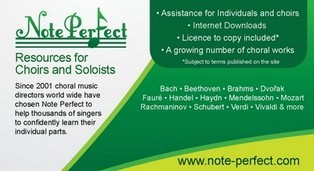Personent hodie (arr Holst)
Carols
| Music: | (13th Century melody) | |
| Arranger: | Gustav Holst | |
| Voicing: | Unison and Organ | |
| Words: | From Piae Cantiones 1582 |
Personent hodie
Voces puerulae,
Laudantes iucunde
Qui nobis est natus,
Summo Deo datus,
Et de virgineo
Ventre procreatus.
Voces puerulae,
Laudantes iucunde
Qui nobis est natus,
Summo Deo datus,
Et de virgineo
Ventre procreatus.
In mundo nascitur;
Pannis involvitur;
Praesepi ponitur
Stabulo brutorum
Rector supernorum;
Perdidit spolia
Princeps Infernorum.
Pannis involvitur;
Praesepi ponitur
Stabulo brutorum
Rector supernorum;
Perdidit spolia
Princeps Infernorum.
Magi tres venerunt;
Munera offerunt;
Parvulum inquirunt,
Stellulam sequendo,
Ipsum adorando,
Aurum, thus et myrrham
Ei offerendo.
Munera offerunt;
Parvulum inquirunt,
Stellulam sequendo,
Ipsum adorando,
Aurum, thus et myrrham
Ei offerendo.
Omnes clericuli,
Pariter pueri,
Cantent ut angeli:
Advenisti mundo:
Laudes tibi fundo
Ideo: Gloria
In excelsis
Pariter pueri,
Cantent ut angeli:
Advenisti mundo:
Laudes tibi fundo
Ideo: Gloria
In excelsis
View or download the score
Clare College Choir, Cambridge
The Orphéon de Trois-Rivières with the collaboration of the choir of the Pauvres de St-François presented Faste Noël at Ste-Cécile Church
“Personent hodie” is a Christmas carol originally published in the 1582 Finnish song book Piae Cantiones, a volume of 74 Medieval songs with Latin texts collected by Jacobus Finno (Jaakko Suomalainen), a Swedish Lutheran cleric, and published by T.P. Rutha. The song book had its origins in the libraries of cathedral song schools, whose repertory had strong links with medieval Prague, where clerical students from Finland and Sweden had studied for generations. A melody found in a 1360 manuscript from the nearby Bavarian city of Moosburg in Germany is highly similar, and it is from this manuscript that the song is usually dated.
The Latin text is probably a musical parody of an earlier 12th century song beginning “intonent hodie voces ecclesie”, written in honour of Saint Nicholas, the patron saint of Russia, sailors and children – to whom he traditionally brings gifts on his feast day, 6 December. Hugh Keyte and Andrew Parrott note that two of the verses have an unusual double repeat (‘Submersum, -sum, -sum puerum’; ‘Reddens vir-, vir-, vir- ginibus’). In ‘intonent hodie’, these were used to illustrate the three boys and three girls saved by St Nicholas from drowning and prostitution, respectively. The text was probably re-written for the Feast of the Holy Innocents (28 December) when choristers and their “boy bishop” traditionally displaced the senior clergy from the choir stalls. The carol is still often associated with Holy Innocents’ Day.
Songs from Piae Cantiones continued to be performed in Finland until the 19th century. The book became well known in Britain after a rare copy of Piae Cantiones owned by Peter of Nyland was given as a gift to the British Minister in Stockholm. He subsequently gave it to John Mason Neale in 1852, and it was from this copy that Neale, in collaboration with Thomas Helmore published songs in two collections in 1853 and 1854 respectively.
The most common English translation of the text is by “James M. Joseph”, a pseudonym of the composer Jane M. Joseph (1894–1929). She translates the title as “On this day earth shall ring”, although there are several other English translations. Other versions include Elizabeth Poston’s 1965 “Boys’ Carol”, which translates the first line of the text as “Let the boys’ cheerful noise/Sing today none but joys” and John Mason Neale’s “Let the Song be Begun”, which uses the melody but not the text of the carol. Aidan Oliver’s non-verse translation renders the text as “Today let the voices of children resound in joyful praise of Him who is born for us.”
This article is licensed under the GNU Free Documentation License. It uses material from the Wikipedia article "Metasyntactic variable".
Comments
Please make comment on the score and music here.
- Keep to the topic of the music on this page. Be polite, comments are moderated
- Tell us where you have used this music and if your performance is published on the internet, please put a link to it in the website field
- Give performance advice/suggestions
- Ask others questions about performance techniques
- Please do not make requests for music on this page
- Your email address is not published
0
reviews
Our sponsors
Other Carols
